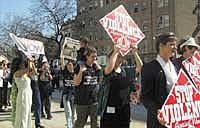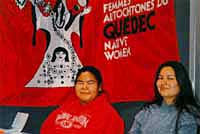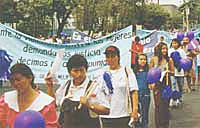April 2002 - Snapshots of Home and Elsewhere - The Americas
 |
|
Women in economic perilThe dramatic consequences of dollarization on countries' economies-highlighted by the political crisis that erupted in Argentina at the end of 2001-are being felt in El Salvador, Panama and Guatemala. They consist of cuts in social services (health, pension) and the further impoverishment of women. "We want financing for housing, goods, non-traditional employment training and access to land," declare Venezuelan women.
Against the prevailing morality, for peaceWomen of the Americas are also battling against the prevailing "moral order," whether traditional or more recent, that opposes any move toward liberalizing abortion or even, as is the case in Chile, divorce. On March 8, 2000, a Nicaraguan woman demanded "that abortion not be considered a sin." Peace was a key concern of Colombian women: approximately 300 women from the southern part of the country travelled for a week by bus to hold talks with the guerilla forces who were then in negotiations with the government. They described the suffering of women "who no longer wish to give birth to children just to see them die." They rejected the Colombia Plan that the United States wanted to impose in the region.
Cuban women denounced the consequences of the North American blockade. They used the March as an opportunity to raise awareness of wife assault by holding workshops and distributing information. In Costa Rica, women called for "equality, social justice, peace and development." Violence and poverty are also problems in the NorthThere was massive mobilization in Québec, birthplace of the World March of Women. Women highlighted the reality of poverty within a rich country. At the federal level, Canadian women drafted 68 demands to improve conditions for poor women and victims of violence. They expressed solidarity with immigrant women and lesbians in particular. They organized locally, in their own communities. While Aboriginal women carried their anti-violence message along the Fraser River, other women crossed the country on bicycles during the Week Without Violence. Their odyssey culminated in New York City. On October 15, in Washington D.C., U.S. women used the occasion of the 2000 presidential election campaign to express concern over the anti-abortion and right-wing movements. Women organized actions in the Rio Grande region along the Mexican border. "Here, in the United States, most poor people are women and children, but instead of improving their situation, legislators and politicians accuse them of 'social ills'" said the Vice President of the National Organization for Women, on March 8, 2000. 
Violence, a major concern of women in the United States.
|
|
|
|
Copyrights
:
CC by-nc-sa 2.0
Last modified 2006-03-23 03:09 PM This item is available in Français, English, Español |




